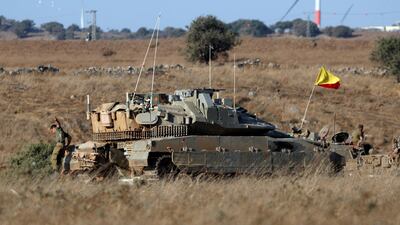Israeli aircraft hit Syrian army posts on Monday in retaliation for attempts to lay explosives in the Golan Heights.
“The targets struck include observation posts and intelligence collection systems, anti-aircraft artillery facilities and command and control systems in Syrian Armed Forces bases,” the Israeli army said.
Israeli helicopters also fired rockets at the army near Quneitra in the south, and the regime activated its air-defence systems against "hostile targets" near Damascus, Syrian state news agency Sana reported.
The Syrian Observatory for Human Rights reported strikes earlier in the day on Abu Kamal city, near the Iraqi border. It said the dawn air raids killed 15 people.
Last month, Israeli army helicopters struck military targets in southern Syria in retaliation for missiles being fired towards Israel.
Israel did not directly blame Syrian forces, but said it held the Damascus government responsible.
Earlier on Monday, the Israeli army said it had killed four men laying explosives near the Israeli-occupied sector of the Golan Heights.
“They were inside Israeli territory but beyond the fence,” a military spokesman said.
He said an Israeli commando unit lying in wait attacked the intruders with assault rifles and sniper fire, backed by air strikes.
“Our estimate is that all four were killed,” the spokesman said.
Prime Minister Benjamin Netanyahu said on Monday that “the army thwarted an attempted attack on the Syrian front”.
“We don’t let our guard down,” Mr Netanyahu said.
Several Israeli media outlets reported that Monday’s actions were in response to an increased threat from Iran-backed Hezbollah, which has a significant presence in Syria.
Last month, five Iran-backed fighters were killed in an Israeli missile strike south of Damascus, the Observatory said.
Last week Monday, Israel said it had thwarted an infiltration attempt from Lebanon by up to five Hezbollah gunmen, a claim denied by the group.
Israel reported an exchange of fire that forced the men back into Lebanon. It said it fired artillery across the heavily guarded border for defensive purposes.
“We do not know at this stage and we cannot confirm a link between this terrorist squad and Hezbollah or Iranians,” an Israeli military spokesman said.
“We know that there are many different factions operating on Syrian soil.”
The Observatory said it was likely, but could not be confirmed, that the attackers were from the Syrian Resistance to Liberate the Golan, a Hezbollah-linked group.
















